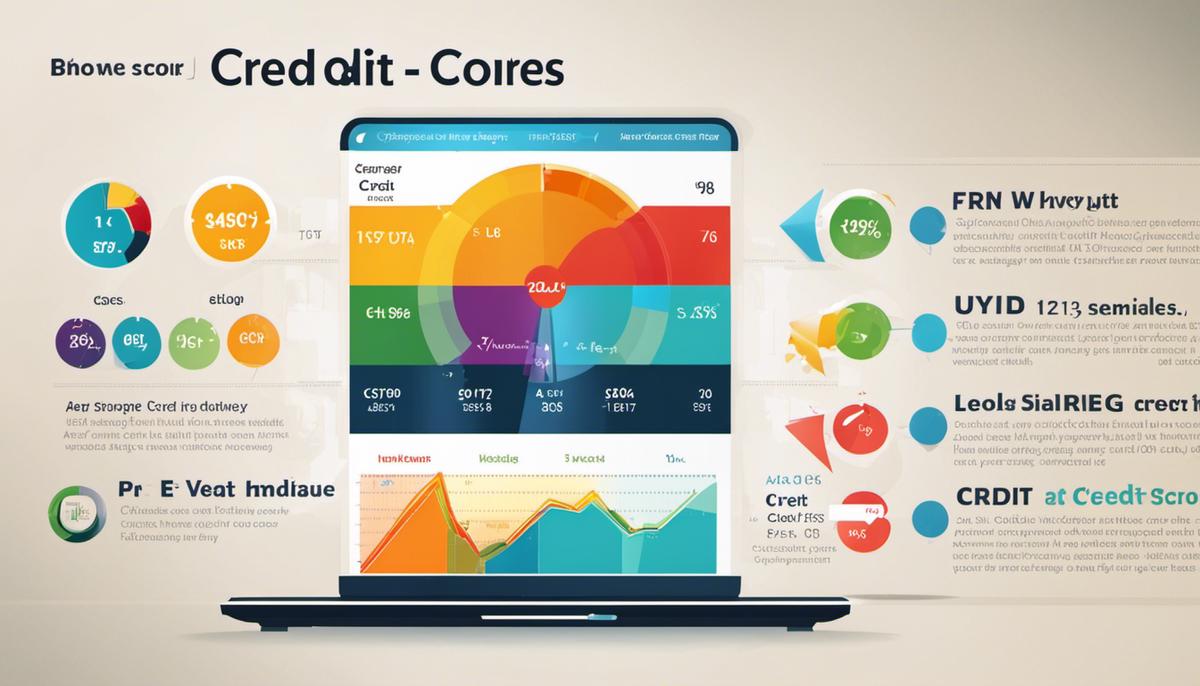Understanding the numerical feast that is the credit score can seem daunting at first glance. Lore abounds regarding the mystical indicators that lead to a higher creditworthiness, but rest assured, it’s all grounded in practical and understandable principles. For the uninitiated and credit-savvy alike, this overview aims to demystify the enigma, breaking it down into digestible components: the fundamentals, the heavyweight factors like payment history and credit utilization, the often-overlooked aspects of credit mix and new credit, and finally, a strategic roadmap to bolster your credit score. By merging these aspects, we paint a stark and comprehensive image of credit score factors, preparing you for journeying into the heart of personal and business financial management.
Table of Contents
Understanding Credit Score Basics
Cracking the Code: Essential Insights into Credit Scores for Entrepreneurs
As the backbone of your business finance, understanding your credit score’s intricacies is crucial. Navigating the entrepreneurial landscape armed with this knowledge is like knowing the ins and outs of your GPS. It might not be the most exciting aspect of operating a business, but understanding credit scores can make a substantial difference. It can unlock opportunities, ensure financial growth, and anchor your company during periods of economic instability and uncertainty. Here’s the all-encompassing view of the credit score landscape even seasoned entrepreneurs should be aware of and refocus on periodically.
The term “credit score” gets thrown around a lot, but what does it exactly mean? In essence, it’s a three-digit number, typically ranging from 300 to 850, that summarizes your credit risk. Creditors and lenders use it to decide whether you’re likely to pay back borrowed money. The higher this number, the lower the perceived risk, making you an attractive candidate for loans and credit lines.
What many fail to understand is credit scores are not set in stone; rather, they’re dynamic and can shift due to multiple reasons. A vital concept to comprehend is that there are several models for these scores, with the most popular being FICO and VantageScore. While both follow a similar framework, they use unique algorithms, which may result in slight score differences. Staying updated and being aware of the different scoring methods keeps entrepreneurs one step ahead in the financing game.
An integral part of the credit scoring model is the factors that affect its calculation – payment history, credit utilization ratio, credit history length, credit mix, and new credit inquiries. Among these, your payment history and credit utilization hold the heftiest weight. Late payments or defaults and high utilization rates can negatively sway your score. Regular monitoring and diligent repayments paired with a lower credit utilization ratio can immensely improve your business’ credit score.
However, bear in mind, a lower credit score alone is not a business death knell. While it might limit access to the best interest rates and terms, it doesn’t necessarily bar funding access. Various alternative lending platforms consider other business metrics beyond credit scores – operational history, sales revenue, and more. Tanked credit score? Don’t panic – refocus efforts, strategize, and bounce back with extra perseverance.
Yes, building and maintaining an impressive credit score takes discipline, careful financial planning, and plenty of patience – virtues great entrepreneurs already possess. However, emerging business trends, like the rise of fintech and alternative finance, remind us to stretch beyond traditional business wisdom and regulations is the true hallmark of entrepreneurship.
Understand the credit landscape, learn the nuances, but remember not to be confined by this three-digit number completely. As with all things business, it’s the tenacity and the ability to maneuver through, around, and over obstacles that truly creates a successful entrepreneur. After all, there’s no single standardized compass guiding the entrepreneurial journey. Be informed, be diligent, but above all, be disruptive.

The Impact of Payment History and Credit Utilization
The Anchoring Power of Payment History and Credit Utilization on a Stellar Credit Score
Entrepreneurs are obligated to grasp the intricate cogwheels that drive the complex machinery of credit scores. A masterful comprehension of this subject could spark the difference between a financial stagnation and an eruption of thriving prosperity. Providing testimonials to our financial discipline, credit scores are a barometer of our monetary reliability, apt to capture the ardent interest of lenders and investors alike. Among the factors spinning the gearwheels of credit scores, none seem to possess as much gravity as payment history and credit utilization.
Transcending across credit scoring models; be it FICO or VantageScore, two striking features sing the same tune conspicuously: on-time payments and credit utilization. Both factors aren’t merely tossed on the weighing scale of credit scoring; instead, they are the linchpins that significantly dictate the direction in which the vehicle of your credit score cruises.
Payment history, in essence, is the chronicle of your payments; a reflection of your adherence to paying bills and debts on time. It screams loyalty and commitment, an entrepreneur’s hymn that rings harmoniously in the ears of lenders. Market experts can testify to the fact that a flawless payment history can inflate your credit score like a hot air balloon, infusing it with the buoyancy to rise to dizzying heights, thereby magnifying the allure in the eyes of debt issuers.
Venturing deeper into the heart of the credit score machinery, we chance upon the revolving dynamo of credit utilization. As entrepreneurs, we ought to view this element as the fuel gauge of our credit vehicle. Max out the fuel tank, and the vehicle will grind to a startling halt. An optimal credit utilization rate oscillates around the 30% mark, ensuring your credit vehicle remains sufficiently fueled, but not overburdened.
Where conventional players like banks stagger to adjust their lens, alternative lending platforms are marching forth with an avant-garde perspective that consider a broader spectrum of business metrics. These platforms are morphing the landscape, proving there is no ironclad rule that necessitates a stellar credit score for every financial leap. Yet, an entrepreneur’s ability to master the utilization of credit and maintain punctuality with payments remains a universal language of financial proficiency.
The emergence of fintech as a commanding player in the business arena is propelling an evolution in the understanding of credit scores. While this industry does open doors for entrepreneurs with less-than-stellar credit scores, the undercurrent of meticulous credit management remains prevalent. Irrespective of industry trends, maintaining prudence and discipline in credit matters embodies the fundamental core of successful entrepreneurship.
The journey to entrepreneurial success does not demand a verdict from credit scores, but rather blesses those who unearth the secrets of its intricate gears. What’s monumental is the involvement, tenacity and the ability to navigate the sea of obstacles. As entrepreneurs, we shape our destiny, steering the rudder with an unyielding resolve. Credit scores will count, but they are mere numerical figures, not a verdict on your capabilities. The ability to understand them, leverage them, yet remain unconfined by them counts as the real triumph.
Innovate, adapt and conquer. The power lies within your history of payments and manageable utilization of credit, dictating your journey towards stellar credit and ultimately, pivotal entrepreneurial success. Dive deep, grasp the gears of credit mechanics, and steer your credit vehicle expertly towards the envisioned success horizon.

Effect of Credit Mix and New Credit on Credit Score
Diversification of credit, or incorporating an array of credit types into your financial portfolio, can serve as a potent strategy for empowering entrepreneurial growth and strengthening your financial prowess. Dispersing credit obligations across various avenues, such as credit cards, auto loans, mortgages, and business loans, can provide significant rewards for your credit score, comprising around 10% of your FICO score calculation. The rationale? A diversified credit mix demonstrates deftness in managing multiple obligations, making creditors more likely to entrust you with larger credits.
But the secret to the sauce lies in the balance. Veering into a state of over-diversification can become a path strewn with excessive debt burdens. There exists a critical balance that entrepreneurs must strike to avoid being swallowed by debt, thus preserving the integrity of their credit score while demonstrating competent financial management capabilities.
Credit diversification, however, is not merely enough on its own. An entrepreneur must also focus on opening fresh credit. While this might initially lead to a slight drop in your score, over the long term, landing new credit within your expenses affordability can have positive impacts on the credit score via credit utilization factor.
To unlock the nuts and bolts, let’s first understand credit utilization. It comes down to the ratio of your current credit card balances versus the total available credit limits. Accounting for almost 30% of the FICO Score, it holds significant weight in dictating the health of an entrepreneur’s credit score. Bear in mind that maintaining low credit utilization rates reflects positively on your credit score, as it emanates responsibility and discipline in credit management, crucial traits that lenders seek.
By consistently paying for fresh credit without delay, and ensuring the balance stays within 30% of the available limit, one creates a scenario of controlled credit expansion. Such usage of credit along with successful monthly repayments helps to convince lenders of your reliability. Hence, by opening new credit lines and fulfilling repayments in a timely manner, one can gain a sturdy credit score.
This mechanism reflects successful entrepreneurial tenacity: the ability to take calculated risks, innovate, and consistently deliver. It’s the same attitude that has allowed industry pioneers to triumph in leading-edge arenas, from fintech revolutions all the way to alternative lending platforms.
In essence, credit scores are just one spoke in the wheel of entrepreneurial success, variables in an intricate formula. Credit diversification and timely acquisition of fresh credit can be understood as a litmus test for entrepreneurial adaptability.
However, remember, the cornerstone to successful credit management lies in clear comprehension and strategic action. Do not become a victim to overextending credit or neglecting timely repayments. The pursuit of a sterling credit score should never eclipse the journey of entrepreneurship or the vision driving your ambition.
Ultimately, financial acumen and entrepreneurial innovation go hand-in-hand to create that sweet magic called outstanding business performance — one where the credit score is an ally in elevating, not limiting, your quintessential entrepreneurial prowess.

Photo by nathanareboucas on Unsplash
Scaling Credit Score – A Strategic Approach
Strategic Moves to Elevate Entrepreneurs’ Credit Scores
In the dynamic world of entrepreneurship, each venture represents a distinctive formula of investment, risk, and potential return. And among these ingredients, credit score invariably emerges as a crucial element — a proverbial rune determining the ease of access to necessary business financing. But, how can an entrepreneur put the odds in their favour and escalate their credit score?
In the quest of credit score improvement, strategic diversification of credit is one proactive step. Not all credit is created equal, and an intelligent mix — such as installment loans, credit cards, and lines of credit — can enhance your credit profile. Diversification displays credit proficiency by crafting a multifaceted narrative of responsible credit management, hence fortifying your credit score.
But beware — the road to credit diversification is fraught with illusions of over-diversification. It’s imperative to strike a solid balance. An excess of credit lines might portray resourcefulness, but lenders might also perceive it as reckless financial behavior. Instead of trying to amass a plethora, the focus should be on how effectively different lines of credit are managed.
Talking about credit management, let’s dissect the power of a new credit line. It may seem counterproductive, but opening new credit can actually serve as a catalyst for elevating your credit score. Again, moderation is key. The intent is not to open multiple accounts in short order but to gradually widen your credit portfolio. This innovative strategy helps lower credit utilization — the percentage of your credit limit you’re using — which is pivotal in the credit scoring model.
In entrepreneurship, as in credit management, timing is everything. A common denominator between high credit scores and successful enterprises is the impeccable timing of repayments. Timely repayment bolsters the credit score by projecting credibility and financial stability, factors instrumental in obtaining better terms from lenders. Implement an eagle-eye strategy, and never neglect your payment deadlines.
It is noteworthy that a clear understanding of credit is paramount to its strategic management. Entrepreneurs must ingrain the concept of credit utilization — aiming for a rate lower is always better. Similar to how overexpansion may jeopardize a business, high credit utilization can be a red flag for lenders.
Lastly, prudence needs to be automatic in credit management. While ambition fuels entrepreneurship, it shouldn’t lead to overextending credit or overlooking repayments, two potential dangers to high credit scores. Just as strategic vision guides the entrepreneurial journey, balance must lead credit management.
In conclusion, entrepreneurs can thoroughly elevate their credit scores by innovation and strategy. Diversify your credit, wisely open new lines, make timely repayments, and maintain low credit utilization rates. Armed with these strategies, a credit score becomes not a stumbling block, but a stepping stone to greater entrepreneurial achievement.

Photo by nathanareboucas on Unsplash
It is easy to reduce the entire discussion about credit scores into an intimidating game of numbers and percentages. However, the true essence lies in recognizing it as a holistic reflection of your financial behaviors, decisions, and resilience over time. From the basics to more complex determinants like credit utilization and payment history, from striking a balance in credit mix to strategically planning for new credit, a tactical approach can put you at the helm of your financial story. The success of your journey to a stellar credit score is rooted in embracing these principles, adjusting habits where needed, and consistently steering your financial ship with wisdom and foresight. So, embark on this journey with confidence, a good dose of patience and the keys we have handed you, aiming to richly reward yourself with a solid credit ranking in the long run.

Lian Jadepeak is a Chartered Financial Analyst (CFA) with a sharp acumen for investment strategies and financial markets. With a background in finance and years of experience in wealth management, Lian offers readers expert insights into smart investing, market trends, and portfolio management. Her clear, analytical approach helps demystify complex investment concepts for both seasoned and novice investors alike.

